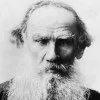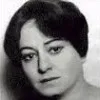Our profession is dreadful, writing corrupts the soul. Every author is surrounded by an aura of adulation which he nurses so assiduously that he cannot begin to judge his own worth or see when it starts to decline.
Leo Tolstoy (1828-1910) Russian novelist and moral philosopher
Letter to Nikolay Strakhov (1876)
(Source)
Quoted in Henri Troyat, Tolstoy (1967).
Quotations about:
self-evaluation
Note not all quotations have been tagged, so Search may find additional quotes on this topic.
Four be the things I am wiser to know:
Idleness, sorrow, a friend, and a foe.Four be the things I’d been better without:
Love, curiosity, freckles, and doubt.Three be the things I shall never attain:
Envy, content, and sufficient champagne.Three be the things I shall have till I die:
Laughter and hope and a sock in the eye.Dorothy Parker (1893-1967) American writer, poet, wit
“Inventory,” Life (11 Nov 1926)
(Source)
Reprinted in Enough Rope (1926).
You have to look at yourself objectively. Analyze yourself like an instrument. You have to be absolutely frank with yourself. Face your handicaps, don’t try to hide them. Instead, develop something else.
Audrey Hepburn (1929-1993) Belgian-English actress
Quoted in Barry Paris, Audrey Hepburn, ch. 4 (2002)
(Source)
Although men are accused for not knowing their own weakness, yet perhaps as few know their own strength. It is in men as in soils, where sometimes there is a vein of gold which the owner knows not of.
Jonathan Swift (1667-1745) English writer and churchman
Thoughts on Various Subjects (1706)
(Source)
There is no method more likely to cure passion and rashness, than the frequent and attentive consideration of one’s own weaknesses: this will work into the mind an habitual sense of the need one has of being pardoned, and will bring down the swelling pride and obstinacy of heart, which are the cause of hasty passion.
James Burgh (1714-1775) British politician and writer
The Dignity of Human Nature, Sec. 5 “Miscellaneous Thoughts on Prudence in Conversation” (1754)
(Source)
When the million applaud you, seriously ask yourself what harm you have done; when they censure you, what good!
Charles Caleb "C. C." Colton (1780-1832) English cleric, writer, aphorist
Lacon: Or, Many Things in Few Words, Vol. 1, § 183 (1820)
(Source)








